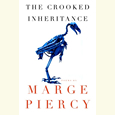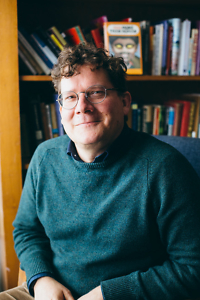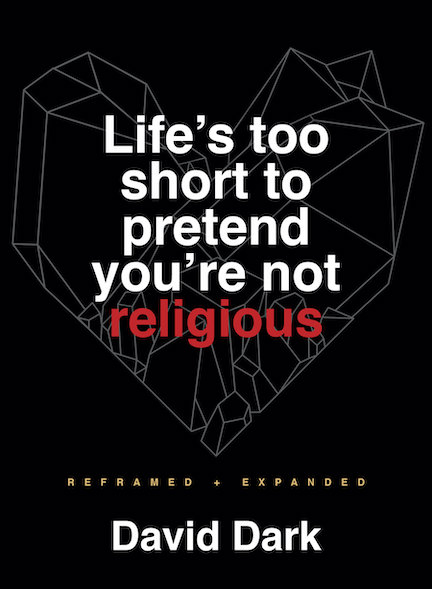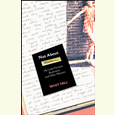Ghosts of Nashville
John Prine talks about songwriting, Nashville, Paradise, and his new book, Beyond Words
When a writer lands an unexpected chance to interview a musical hero like John Prine—creator of such timeless ballads as “Paradise,” “Sam Stone,” and “Angel from Montgomery”—the only option is to put everything else on hold. If the last-minute interview didn’t end up being a conventional exchange of questions and answers, no matter: “unconventional” and John Prine have always gone together in ways that generally turn out magical.
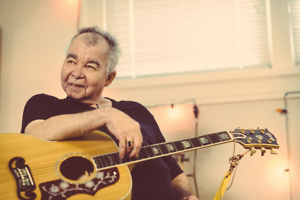 Musicians as varied as Bob Dylan, Johnny Cash, and Roger Waters have numbered Prine among their favorite songwriters. His work has been recorded by countless country legends and by cross-genre stars like Carly Simon, Bette Midler, and Norah Jones. “He did a better job of holding up the mirror of art to the ‘60s and ‘70s than any of our official literary poets,” Ted Kooser, the former U.S. poet laureate, writes of Prine’s new book, Beyond Words. More than forty-five years after Prine’s self-titled first album was released, the seventy-year-old is still holding up that mirror with new work and live performances.
Musicians as varied as Bob Dylan, Johnny Cash, and Roger Waters have numbered Prine among their favorite songwriters. His work has been recorded by countless country legends and by cross-genre stars like Carly Simon, Bette Midler, and Norah Jones. “He did a better job of holding up the mirror of art to the ‘60s and ‘70s than any of our official literary poets,” Ted Kooser, the former U.S. poet laureate, writes of Prine’s new book, Beyond Words. More than forty-five years after Prine’s self-titled first album was released, the seventy-year-old is still holding up that mirror with new work and live performances.
Beyond Words collects sixty of Prine’s favorite compositions, and it lists his preferred chords and lyrics for each. (Pickers should avoid lending this book to their musical friends if they ever hope to see it again). But Beyond Words is more than a songbook. It’s also part coffee-table book—containing previously unpublished photographs of Prine’s family and backstage moments, as well as facsimiles of manuscripts and early reviews—and part musical commentary, with Prine’s witty asides scattered throughout the text.
A word about the exchange that follows: with most Chapter 16 interviews, authors answer questions by email, sending their answers in writing. Sometimes the Q&A is a transcript of a live conversation between author and interviewer, either in person or by phone, instead. What follows is none of the above. Rather than sending answers to our emailed questions in writing, Prine sent a recording made by his wife, Fiona Whelan, who read our questions aloud to him at their kitchen table in Nashville, often rephrasing them in her own words and responding personally to his answers. She also asked some follow-up questions of her own. The transcript below fails to capture Whelan’s beautiful Irish accent or Prine’s gravely basso profondo, and it necessarily leaves out the many times they laughed throughout, but we think you’ll recognize it as a magical conversation even so.
Whelan: OK, so today is May 1, 2017. This is Fiona and….
John Prine: John.
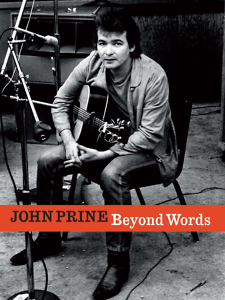 Whelan: And we’re sitting here at the kitchen table at our home, and we’re going to talk about John’s new book. Reading Beyond Words is like going in the attic and opening a box of memories. How did the idea for it come about?
Whelan: And we’re sitting here at the kitchen table at our home, and we’re going to talk about John’s new book. Reading Beyond Words is like going in the attic and opening a box of memories. How did the idea for it come about?
John Prine: There was only one songbook I knew of out with my songs—some of the songs from the first record. Warner Bothers put that out. I always wanted to put out a book of my selected lyrics and just put the chords above them because most people that play my songs kind of know them from the record, and they don’t read music like I don’t, so they just need the chord change. They want to know when I change the chord, so I wrote it out exactly the way I do it onstage. And that pretty much was the seed that led to the book in the first place.
Whelan: You talk a couple of times in the book about your hair. Kind of being a little bit critical about your hair, making comments about your hair.
Prine: My hair and I have always been at odds with each other.
Whelan: Who do you see now in the photos of that long-haired young man on stage?
Prine: A guy that wanted to have hair like Elvis. Instead he had hair that just fought against him. It’s like me and gravity and my hair are in three different worlds.
Whelan: Is there anything you wish you could tell him now?
Prine: Yeah, get a haircut.
Whelan: Beyond Words is dedicated to the late Al Bunetta, legendary manager, co-founder of Oh Boy’s, and a major fixture in Nashville. What’s your very favorite memory of him? Something that comes quickly to mind.
John Prine: Me and Al, when we first met he took me to a little soda fountain in New York City. The whole record business was centered in New York at the time—1970, 1971—and Al was me and Steve Goodman’s designated agent. We were assigned to him, and he was assigned to us. We found out, me and Steve, that Al got us because nobody else wanted us. It was an agency that booked, like, Vegas acts, circus acts. The same day Steve and I went up there, there was a monkey, a chimpanzee who was famous for being on the morning show, The Today Show. He had a three-piece suit on and was smoking a cigar.
Whelan: That’s the monkey, not Al?
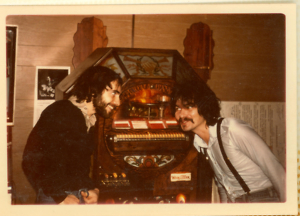
Prine: That’s the monkey. Al became our agent, and when I went there and stayed at Al’s apartment, Al took me to a soda fountain and bought me one of them egg creams, which is an East Coast thing. It’s like a milk shake, but they call them an egg cream. It’s halfway between a soda and a milkshake.
Whelan: And you loved it?
Prine: It was pretty good, but I never got one again. I went back to milkshakes right away. But we hit it off. We were both from the same kind of neighborhoods. I was from an Italian-American neighborhood that was right next door to where I grew up. It was an exact mirror image of when Al took me to his hometown in Jersey. I mean the same people, same sort of food, same everything.
Whelan: So there was an immediate affinity when you guys met? You were the same kind of guys?
Prine: Oh yeah. Al confessed to me that he was not a big agent—he was just starting, and he didn’t know anything either. I didn’t know anything. Al would just go into a place—he could get into anywhere just bluffing his way into it. And that’s the way we kind of faced the world. It was us against the world. Al always said, he used to sit in Jersey, looking over at Manhattan, and say, “Big Apple, someday I’ll get you.”
Whelan: Well, he kind of did. The book has, obviously, a lot of family pictures and photos that were taken “down by the Green River.” What was it like the last time you visited Mulhlenberg County? I mean, you go every year, but what does that river look like now? Or what does that place look like compared to your childhood memories of it?
Prine: The few times I’ve had access to a boat in the latter years and been able to go down the river, it surprisingly looks a lot like it did when I was a kid. Because when you’re on the river, everything’s grown up, the grass and the bushes, and you can’t see all the damage that’s been done. Except when you go right by where the town sat. You know, of course the coal chutes and everything are on the river where they loaded the barges up.
Whelan: You’re talking about Paradise?
Prine: Yeah, where Paradise sat. But going down the river brings back a lot of memories because it pretty much looks like when my Granddaddy Ham used to take me down the river, and Bubby Short. Our dad would put his bib overalls on and get in the boat, and we’d act like we were going fishing for catfish. It was pretty neat.
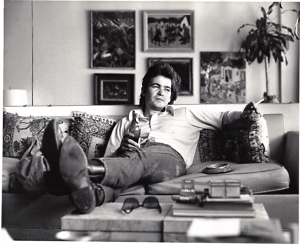 Whelan: You describe writing “Let’s Talk Dirty in Hawaiian” on the patio of Nashville’s Rock and Roll Hotel in the ‘80s. For you, what’s a typical setting for songwriting these days?
Whelan: You describe writing “Let’s Talk Dirty in Hawaiian” on the patio of Nashville’s Rock and Roll Hotel in the ‘80s. For you, what’s a typical setting for songwriting these days?
Prine: Anywhere. Anywhere I can get it. I just try to leave my antenna out. Driving is a good place to work out ideas.
Whelan: Where was the last place you wrote a song?
Prine: The last place I wrote a song was over on a train going from London to Glasgow? Glasgow to Manchester.
Whelan: Glasgow to Manchester.
Prine: Glasgow to Manchester. It was just a couple weeks ago, we was all—Fiona and Amanda Shires and me—took a train. We had the day off just to travel. We took a train to Manchester. No—we played that night.
Whelan: Um-hmm.
Prine: Alright, we didn’t have no days off at all. We’re hardworking soldiers.
Whelan: Let’s get back to the songwriting.
Prine: Yeah, what about it?
Whelan: You wrote a song that day.
Prine: I did, yeah.
Whelan: Just sitting on the train?
Prine: Yeah. It was an idea. Most of the time the ideas I have, they’re marinating in my brain. In my mind, I mean. I shouldn’t blame anything on my brain. It’s just something like I’ve had for a while. So I’ve had this chorus that I was knocking around, and I didn’t know how to get to the chorus. Most songs are puzzles. You get the end of a song, you get the middle of a song. It’s very rare that you get the beginning and don’t know where to go. You know?
Whelan: Your songs have always spoken directly to problems that plague our society. What advice would you give young songwriters today who are viewing our political landscape?
Prine: Just follow your gut. When you hear something on the news, what you first think of—where it hits you—because that’s the true place. That’s the place you’re going to end up at. If you think about something too long you might debate it and go back and forth and everything. That’s baloney. You want to get to that place that hits you immediately. Like if something hits you that’s sensitive, or something hits you that you’re angry about, you want that initial spark. That should be the one that starts the fire for the song.
Whelan: Is the Nashville of 2017 anything like the Nashville that you first knew?
Prine: No.
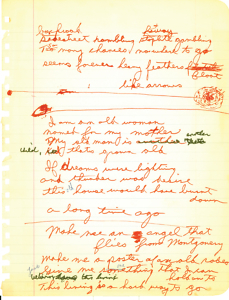
Whelan: It’s always been a magnet for songwriters.
Prine: Right.
Whelan: And it is—we meet them all the time when we’re at restaurants and everything. They’re serving tables….
Prine: Right.
Whelan: But is there anything about Nashville that’s the same draw as it was for you back the ‘70s when you moved here?
Prine: The draw for me was hanging out at Cowboy Jack Clement’s place. Cowboy had this dream, always: it went on twenty-four hours, seven days a week. You walk into Cowboy’s place, and you would walk into his dream. That was really cool because that’s kind of the way I operate.
I would come to Nashville, and if I heard a plane go overhead at night, a small plane, to me that was Jim Reeve’s plane, or Patsy Cline’s, plane trying to get home to Nashville. If I heard a train go by in the middle of the night in Nashville, that’s that lonesome whistle blowing in Hank Williams’s songs. You’d hear at night, too—you’d heard the speedway over at the fairgrounds. And it was all just so cool. It took me back to when I used to visit rural parts of Indiana with my cousins when I was little. One of our older cousins took us to the drag strip and the motorcycle races in the dirt. It reminded me of that. I’d hear the engines roaring, going around the track, and I’d listen to WSM. You’d hear so much good stuff on there.
Whelan: So we still have WSM, and we still have trains.
Prine: I know, but what I’m saying is all the stuff I related to going on before I got here. It was past stuff. But to me there was ghosts on every corner in Nashville.
Whelan: Do you think they’re still here, though? Or do you think the new prosperity has chased all the ghosts away?
Prine: Right now it’s difficult to find because they’ve changed the face of the city so much, but it is still here. It’s still here. I’m probably one of the ghosts now.
Whelan: Well, we’ll finish it on that note.
Prine: OK.
Whelan: Mr. Alive-Well-and-Kicking Prine, thank you very much.
Prine: Boo!
Whelan: He says boo.
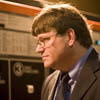
Michael Ray Taylor teaches journalism at Henderson State University in Arkadelphia, Arkansas. He is the author of several books of nonfiction and coauthor of a textbook, Creating Comics as Journalism, Memoir and Nonfiction.

